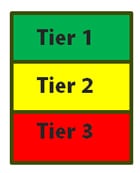
Genomics and Precision Public Health At a Glance
The CDC Office of Genomics and Precision Public Health (OGPPH) provides timely and credible information for the effective and responsible translation of genomics and precision health advances into public health and health care.
OGPPH identifies genomic testing, family health history, and precision health applications that are ready to impact health if implemented effectively:

- The Tier-Classified Guidelines Database is an on-line, searchable resource for genomic testing, family health history, and precision health applications classified based on scientific evidence and evidence-based recommendations. Over 370 genetic testing guidelines have been classified according to a three tiered framework developed by OGPPH, including over 160 classified as tier 1 applications:
- Tier 1/green applications are supported by synthesized evidence or evidence-based recommendations for implementation in practice.
- Tier 2/yellow applications are not supported by sufficient synthesized evidence or evidence-based recommendations for routine implementation in practice; however, they may inform decision making on a case-by-case basis.
- Tier 3/red applications are not supported by synthesized evidence for implementation in practice or have evidence-based recommendations against their use; however, they might be candidates for research.
- The Public Health Genomics and Precision Health Knowledge Base (PHGKB) is an online, customizable, user-based system that provides convenient access to the published scientific literature, CDC resources, and other sources that track progress in human and pathogen genomics, and in other areas of precision public health. PHGKB includes specialized databases on cancer, infectious diseases, rare diseases, and heart, lung, blood and sleep disorders, as well as a CDC-authored publications and state public health genomics program resources. OGPPH searches the peer-reviewed and grey literature on a weekly basis using machine learning, natural language processing, and other methods to identify genomics and precision health information relevant to population health to help keep the PHGKB on the cutting edge.
OGPPH informs about evidence-based genomic and precision health applications to impact population health:
OGPPH has developed a multifaceted communications strategy to share information on genomics and precision health with public health programs, health providers, policymakers, and the general public.
- OGPPH’s Genomics and Precision Health Weekly Update provides timely information about genomic tests, family health history, and precision health to over 70,000 subscribers.
- The Genomics and Precision Health blog addresses current topics such as family health history, direct-to-consumer personal genomic tests, precision health, and pathogen and human genomics, including 38 new blogs in 2018.
- @CDC_Genomics shares tweets on translating genomics and precision health discoveries into actions that improve health and prevent disease with over 11,000 followers.
- The CDC Public Health Genomics Seminar Series offered 10 webinars with over 2000 participants in 2018.
- The OPHG website includes new and updated information on family health history, genetic testing and counseling, and genomics and health. The OGPPH website and PHGKB had over 1.3 million views combined in 2018.
OGPPH integrates evidence-based genomic and precision health applications into practice and programs:
- The Surgeon General’s My Family Health Portrait tool, hosted by OGPPH since September 2018, is a resource for public health programs, health providers and the general public to promote the collection and sharing of family health history information. The My Family Health Portrait tool is being further developed as a platform to aid implementation of evidence-based guidelines that incorporate family health history in disease prevention.
- The Tier 1 Genomic Applications Toolkit and the State Public Health Genomics Program clickable map are OGPPH resources that help support state activities to address the nearly 2 million Americans at increased risk for early-onset cancer or heart disease because they have one of three genetic conditions: BRCA-associated hereditary breast and ovarian cancer, Lynch syndrome, and familial hypercholesterolemia. These resources, which compile state resources and activities relevant to implementing evidence-based recommendations, were developed to help states and their partners build upon existing programs to reach people with these three conditions, and they serve as a framework for incorporating additional tier 1 genomic applications in the future.
- The Genomics and Population Health Action Collaborative (GPHAC), cosponsored since 2015 by OGPPH, the National Cancer Institute and the National Academies of Sciences, Engineering and Medicine, explores public health approaches for accelerating the translation of evidence-based genomic tests and family health history into population health benefits. GPHAC working groups have published performance objectives and outcome measures for state public health genomics programs, a proposed approach for implementing genomics-based screening programs for health adults, and a review on the delivery of cascade screening.
No hay comentarios:
Publicar un comentario